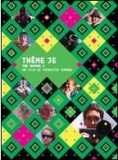| Reviews & Columns |
|
Reviews DVD TV on DVD Blu-ray 4K UHD International DVDs In Theaters Reviews by Studio Video Games Features Collector Series DVDs Easter Egg Database Interviews DVD Talk Radio Feature Articles Columns Anime Talk DVD Savant Horror DVDs The M.O.D. Squad Art House HD Talk Silent DVD
|
DVD Talk Forum |
|
|
| Resources |
|
DVD Price Search Customer Service #'s RCE Info Links |
|
Columns
|
|
|
Camera I
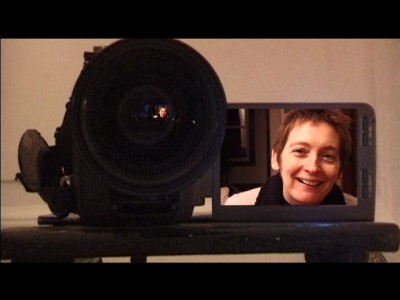
French experimental/documentary filmmaker Françoise Romand (probably best known for her 1986 film Mix-Up) is a candid video diarist, but don't expect any voyeuristic thrills or reality-TV exhibitionism from The Camera I (Thème Je), a compendium of videotaped segments spanning Romand's life from 1999 to 2010. Despite its utterly nonchalant sexual explicitness, confessional readiness, and overall playfulness, it's a cerebral work that comments as much on its own making as it does on its maker/subject, with almost constant attention drawn to the fact that the camera is a significant presence and defining factor in this woman's life.
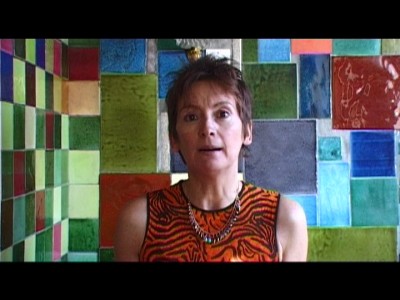
The principal strategy that renders The Camera I both challenging and interesting, all the while lending it a nicely collage-like form, is Romand's non-chronological structuring of her years of video footage; she has instead ordered it according to an emotional arc, like a piece of music. She opens with a moment of startling intimacy--she's waxing her legs in her kitchen--followed by a pre-planned address to the camera in which she informs us that she's the descendant, on her father's side, of one of the cinema-founding Lumière brothers. This free-associates into footage she has shot while visiting her family in her provincial hometown of La Ciotat, and we spend some time with her mother, father, uncle, and grandparents, experiencing their stories (and their storytelling, which is an element unto itself), their bickering, and their self-conscious, sometimes outright hostile bemusement at being on the receiving end of Romand's always-present camera. She informs them that she's been invited for a year as a prestigious guest lecturer at Harvard, which placates the disapproving, rural-agriculturally practical family somewhat; maybe their Françoise isn't wasting her life on this filmmaking business, after all. From there it's on to Atlantic-crossing life between Harvard (a romantic and professional mixed blessing, as it turns out) and Paris, and Romand's conundrum, upon returning to France unemployed, regarding whether or not to sell her apartment in order to finance the "Internet project" (no further details given) she has conceived. After some tortuous on-camera confessional deliberations, she decides to go for it, and letting go of her long-term residence is both traumatic and liberating for her, providing the conclusion to a long chapter of her life and, as it turns out, to the film.
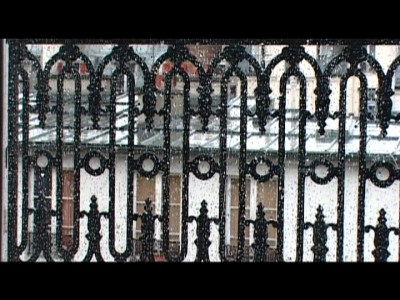
What counts in all of that are the nonstop asides, musings, and spontaneous weirdness that would be revealed in any of our lives were we to document them as consistently as Romand has hers. She is like an archaeologist digging deep in her existence and offering up sample specimens from every stratum, including the romantic/erotic; lovers of various ages, nationalities, races, and genders seem to drift in and out of her life, and we get to know them intimately, in many senses (obviously, they're not shy). This leads to another digression to allow for interjections from Romand and her psychoanalyst as to why she prefers to be sleeping with at least two different men at any given time, which in turn branches off into some fascinating information on and revelations about Romand's well-gnarled family tree and her convoluted, ever-evolving feelings toward its various members. Romand is absolutely exposing and displaying herself and anyone around her with no holds barred, with nary a hint of self-protection and, refreshingly, very little discernible self-regard. This is anything but Romand's tribute to herself; we get her unfiltered, in equally embarrassing states of giddy delight and self-pitying depression. We see her sick, healthy, hopeful, fearful, getting dumped and ending romances, all apparently (but only at first glance) at random. As it becomes evident that Romand has in many ways positioned herself as a spectator alongside us, puzzling at her own confusing, inscrutable life and behaviors, we realize that her purpose in making The Camera I is both to create an exploration of the technology involved and its effects on living and, perhaps more interestingly, as a sort of further examination of her life than could otherwise be achieved, a way of recollecting and trying to make some kind of sense out of the main impressions in a way more concrete than relying on memory alone and more realistic and objective than the linear inwardness of a written journal. Romand's sincerity and commitment, the real personal investment she has in this project, and her unabashed vulnerability and indifference to self-flattery make what could have been a gross example of misguided self-indulgence both charming and compelling--an unpredictable, loose, yet disciplined experience one feels one is sharing in rather than being subjected to.
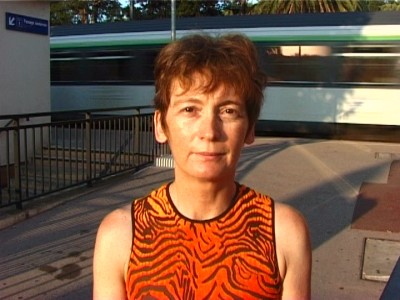
That is not to say that The Camera I is 100% free of self-indulgence, however. Paradoxically, its little gaffes come neither from the footage Romand has made of herself and chosen for the finished work nor from her loose structuring of it, but from unnecessary and distracting editing-room shenanigans that are hit-or-miss but sometimes come off, particularly in her use of music and manipulation of picture speed, as silly, pointlessly slick touches ironically lending an air of amateurishness to a work in which they're uncalled for and out of place. Otherwise, though, the asymmetry and "roughness" of Romand's evolving image-making technologies--from shakily spontaneous to beautifully planned and composed--and her controlled-chaos assemblage of what she has come up with have an effect not unlike that of an extraordinary mosaic: it is the differentiated textures and initially jarring way they contrast and play off each other that lure us in for a closer look, holding our attention until the film's hidden, idiosyncratic order becomes clear.
THE DVD:
The Camera I not only documents Romand's life, but also reveals the evolution of videotaping technology over the decade or it covers; the image quality varies very widely, from blurry old videotape to some remarkably rich, well-defined, high-def-looking images. That variability is, of course, an intentional part of the experience, which is more than adequately preserved on this 4:3 aspect ratio (with occasional non-amamorphic letterboxing) transfer.
Sound:The Dolby Digital 2.0 surround soundtrack is surprisingly wide-ranging and clear, easily capturing the intentionally incongruous array of sound qualities, from tinny one-channel on-the-fly Camcorder sound to more advanced recording and post-production degrees of polish. All sound comes through loud and clear, every nuance (whether rough or smooth) entirely intact.
Extras:The disc includes Romand's first short, the 20-minute Intersections (Rencontres) from 1977, an experiment in the intersection(s) of fact and fiction. The film's story--a provincial painter comes to the big city of Paris to join up with fellow Communists and establish himself on Paris's expansive art scene--is told twice, by the actual young man in question and by an actor, with footage of consultations between the real character and his avatar (along with multiple panning shots of the artist's work) intercut throughout. It's a rough but intellectually sharp and ambitious early work, and certainly a relevant inclusion alongside The Camera I, which finds Romand much looser and more confident with the same documentary/fiction line-blurring approach after years of developing and honing it.
FINAL THOUGHTS:Françoise Romand's The Camera I is a video diary (or, more precisely, carefully selected and structured excerpts from a video diary), but don't let that put you off; Romand is a cinéaste experienced enough to know that her self-shot and self-scrutinizing footage is potentially dull or self-indulgent raw material in need of careful and astute shaping. With only a few missteps, she expertly uses cinematic intuition and technique to alchemize it into a confessional, introspective, very open and vulnerable experience that gives us enough distance to look in on Romand's self-examination and participate in it, enjoying its kaleidoscope-like, unpredictable patterns, which provoke our engagement and examination of our own shifting, subjective impressions as we construct the film's meaning(s) for ourselves. Recommended.
|
| Popular Reviews |
| Sponsored Links |
|
|
| Sponsored Links |
|
|
| Release List | Reviews | Shop | Newsletter | Forum | DVD Giveaways | Blu-Ray | Advertise |
|
Copyright 2024 DVDTalk.com All Rights Reserved. Legal Info, Privacy Policy, Terms of Use,
Manage Preferences,
Your Privacy Choices | |||||||









